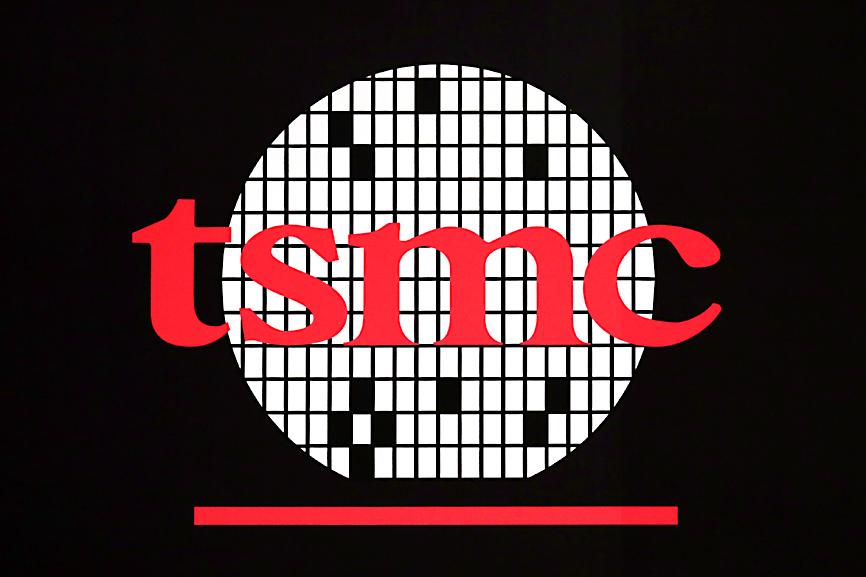Taiwan Semiconductor Manufacturing Co (TSMC, 台積電) plans to allocate a larger portion, or about 9 percent, of its total revenue this year to research and development (R&D) on cutting-edge technologies to safeguard its technological lead amid intensifying competition, the chipmaker’s annual report said.
That could bring TSMC’s R&D budget to more than NT$110 billion (US$3.65 billion) if it reaches its goal of growing revenue by more than 15 percent annually this year — to at least NT$1.23 trillion.
This year’s spending would be a 20 percent increase over last year’s record-high R&D expenditure of NT$91.42 billion.

Photo: EPA-EFE
The bulk, or 70 percent, of this year’s R&D budget is to be spent on advanced technologies, including the 3 nanometer (nm) technology platform and applications, next-generation technologies and 3D IC for system-in-package modules, the report said.
TSMC, a pioneer in the semiconductor industry, said that it began R&D on 2nm technology last year, as it targets 5G-related applications and high-performance-computing devices.
“To maintain and strengthen TSMC’s technology leadership, the company plans to continue investing heavily in R&D,” the report said.
“The markets for TSMC’s foundry services are highly competitive. TSMC competes with other foundry service providers, as well as with a number of integrated device manufacturers,” the company said, referring to the competition it faces.
If TSMC is unable to effectively take on these new and aggressive competitors when it comes to technology, manufacturing capacity, product quality and customer satisfaction, it risks losing customers to these new contenders, the report said.
TSMC, which commands a 52 percent share of the world’s foundry market, competes primarily with Samsung Electronics Co for advanced technology orders, while its Chinese rival Semiconductor Manufacturing International Corp (SMIC, 中芯) is positioning itself to take a bite out of TSMC’s share in China.
TSMC last week said that it plans to increase production of 3nm technology in the second half of 2022, which would make it the foremost foundry offering the technology.
The chipmaker’s report also warned of possible negative effects resulting from the COVID-19 pandemic, saying that the coronavirus might interrupt the global semiconductor supply chain and disrupt some of its suppliers.
There could be downward adjustments in customer demand or production delays for TSMC products, due to forced closures, or partial operations, at factories and offices, the report said.
Due to fallout from the pandemic, the chipmaker expects the global semiconductor industry to see stagnant revenue this year, at best, it said, adding that the industry is expected to grow at a compound annual growth rate of 5 percent between last year and 2024.
The chipmaker also disclosed that company chairman Mark Liu (劉德音) and CEO C.C. Wei (魏哲家) received NT$293 million in compensation apiece last year, accounting for 0.085 percent of net profits last year, the report showed.
Last year, the company paid NT$1.545 billion in compensation to its high-ranking executives.

Intel Corp chief executive officer Lip-Bu Tan (陳立武) is expected to meet with Taiwanese suppliers next month in conjunction with the opening of the Computex Taipei trade show, supply chain sources said on Monday. The visit, the first for Tan to Taiwan since assuming his new post last month, would be aimed at enhancing Intel’s ties with suppliers in Taiwan as he attempts to help turn around the struggling US chipmaker, the sources said. Tan is to hold a banquet to celebrate Intel’s 40-year presence in Taiwan before Computex opens on May 20 and invite dozens of Taiwanese suppliers to exchange views

Application-specific integrated circuit designer Faraday Technology Corp (智原) yesterday said that although revenue this quarter would decline 30 percent from last quarter, it retained its full-year forecast of revenue growth of 100 percent. The company attributed the quarterly drop to a slowdown in customers’ production of chips using Faraday’s advanced packaging technology. The company is still confident about its revenue growth this year, given its strong “design-win” — or the projects it won to help customers design their chips, Faraday president Steve Wang (王國雍) told an online earnings conference. “The design-win this year is better than we expected. We believe we will win

Chizuko Kimura has become the first female sushi chef in the world to win a Michelin star, fulfilling a promise she made to her dying husband to continue his legacy. The 54-year-old Japanese chef regained the Michelin star her late husband, Shunei Kimura, won three years ago for their Sushi Shunei restaurant in Paris. For Shunei Kimura, the star was a dream come true. However, the joy was short-lived. He died from cancer just three months later in June 2022. He was 65. The following year, the restaurant in the heart of Montmartre lost its star rating. Chizuko Kimura insisted that the new star is still down

While China’s leaders use their economic and political might to fight US President Donald Trump’s trade war “to the end,” its army of social media soldiers are embarking on a more humorous campaign online. Trump’s tariff blitz has seen Washington and Beijing impose eye-watering duties on imports from the other, fanning a standoff between the economic superpowers that has sparked global recession fears and sent markets into a tailspin. Trump says his policy is a response to years of being “ripped off” by other countries and aims to bring manufacturing to the US, forcing companies to employ US workers. However, China’s online warriors